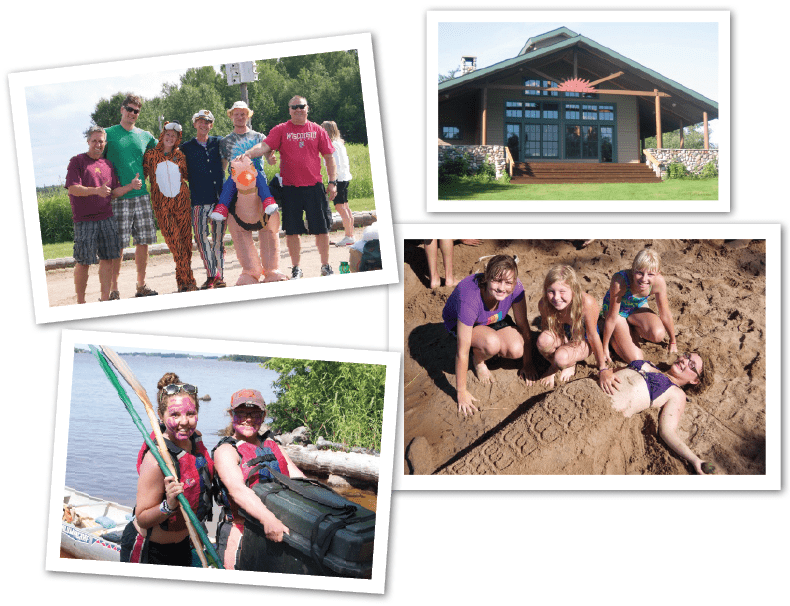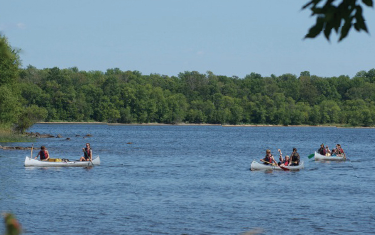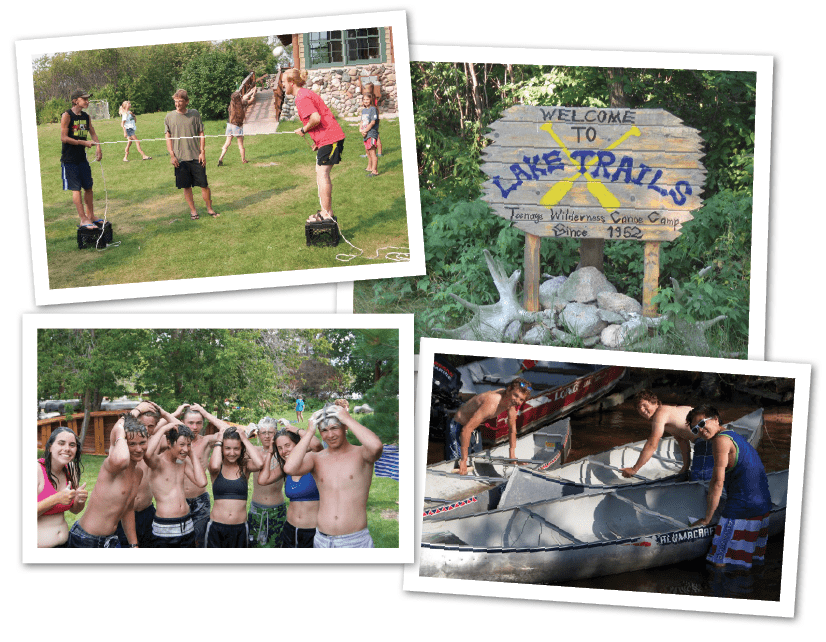By Alissa Johnson
When Laketrails campers arrive at base camp, costumed counselors greet them, singing and dancing, hooting and hollering, and banging on drums. “We’re famous for our welcomes of campers,” says executive director Sue Lemm. And it’s easy to imagine what a sight it must be, especially after the journey to get to Laketrails—simply arriving at base camp is no small feat. Campers typically travel by bus, riding all the way to northern Minnesota, into Canada and then back into Minnesota, into that tiny portion of the state that juts into Canada above Lake of the Woods. They travel the last six miles by boat, from Young’s Bay on Lake of the Woods to the island where Laketrails and the counselors await. For some campers, the journey takes several hours.

But the wild and crazy greeting is about more than giving travel-weary kids a bit of fun. From the moment campers arrive at Laketrails, the goal is to make them feel like they belong. Staff and counselors get to know every camper by name, and take the time to learn what kids like, what they don’t like, and take note of their accomplishments as they get ready for a five or six day canoe trip. “When we give affirmation to a kid, it is genuine. We recognize the accomplishments that they really do,” Lemm says.
She calls it a culture of unconditional acceptance, and believes it’s key to a canoe camp that serves middle school kids and teenagers. “There are a lot of teenagers that for one reason or another don’t feel good. We try to make kids feel good about themselves and feel a genuine confidence,” she said.
That kind of confidence is in many ways a natural byproduct of a program like Laketrails. Campers spend two days in camp planning for their canoe trips. They learn to paddle and carry canoes, pick out and prepare their equipment, and help plan every aspect of their trip. They even pick out where they want to go. On the second day of the session, the counselors do what Lemm calls selling the trips.
“If we have 40 kids that come to a session, we would send out five different canoe trips to different destinations and let the kids choose which trip they want to go on. The guides are in pairs and they will give humorous presentations about where they’re going to go and what they’re going to do, and then the kids choose where they want to go,” Lemm says. “It really helps instill responsibility and gives the kids ownership of the trip. They learn that it’s important to plan and talk together about how they’re going to do this.”

When the groups head out onto trail for five to six days, they take an active role in all parts of trail life—setting up camp, cooking, navigating, paddling, and portaging. Nearly every group returns to camp with the counselors in the duffers’ seats and the kids navigating from the stern. “One of my favorite things is watching kids leave and then fast forwarding to day seven of the session, when they come back to camp and it is just amazing. I’ve been hanging around camp for 18 years now and it never ceases to amaze me, the magic that happens on trail. They come back so cohesive as a team, and they’re so happy and excited and full of crazy stories to tell about things they did on trail,” Lemm says.
Camp staff and counselors are also intentional about helping campers grow in this way. They have three goals for every camper: to grow in his or her sense of self-worth; to grow in his or her appreciation for nature and the outdoors; and to grow in his or her appreciation for community. To make this happen, Lemm says that camp staff are teaching from the moment kids arrive and it’s an approach that keeps many groups coming back. In addition to general session campers, Laketrails also partners with schools and organizations like Eagan High School, Edina High School, and the St. Cloud Girls and Boys Club. Eagan High School has been coming to Laketrails for over 20 years.
“It proves that what we’re doing is a legitimate program and we really are teaching,” Lemm says. The schools customize their trips, adding science, history and other curriculums to the program so students can earn credits. It’s just one more unique aspect of the Laketrails program. Yet if there’s one thing that seems to bring people back again and again—even Lemm herself, who started her Laketrails experience on an adult canoe trip—it’s the culture of unconditional acceptance. Time and again, campers tell Lemm that they come back because the people are just that nice.
One first-time camper in particular, who genuinely seemed to hate everything about camping and being outside, shocked Lemm by coming back to camp the next summer. “(The first year), it was hard to get her out of the cabin to join in with anything,” Lemm says. “The next year, I went over to greet the campers and who gets off the boat? This girl! I said, ‘you came back! You hated this! Why did you come back?”
The girl’s reply was simple. “I loved the people,” she said.
Lemm understands the draw. That first adult canoe trip she took 18 years ago? She just kept coming back. “What kept drawing me back was that I always felt like I was free to be a better person when I was at camp and in that culture of be nice to everyone and accept everyone. Even as an adult I felt that,” she says.
Laketrails offers nine day sessions and campers must be 13 years old or have completed the 7th grade. There is a session for middle school students who have completed 6th through 8th grades. When there is enough interest, Laketrails also offers adult trips.
Learn more at www.laketrails.org

This article originally appeared in the Fall-Winter 2014 edition of Wilderness News Magazine.

